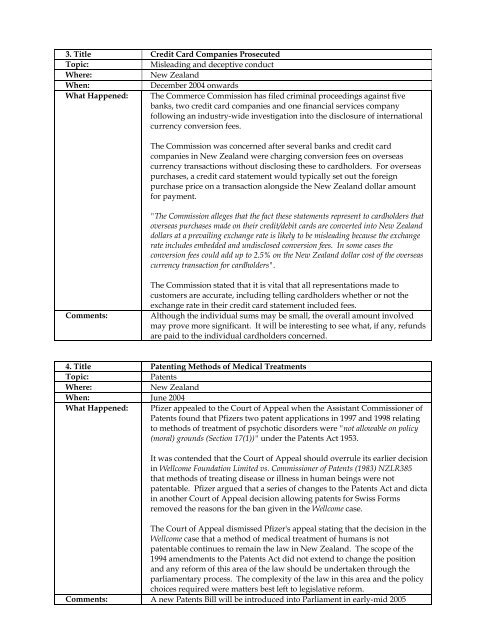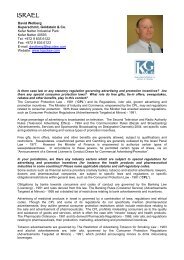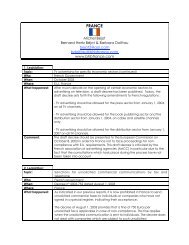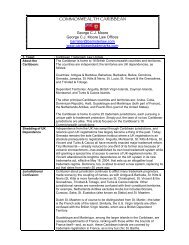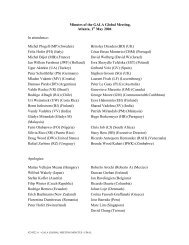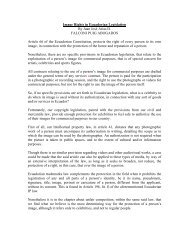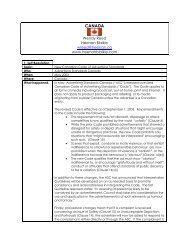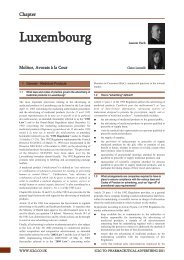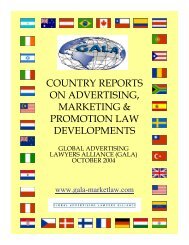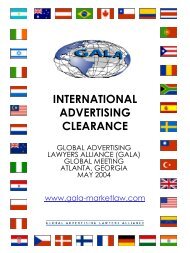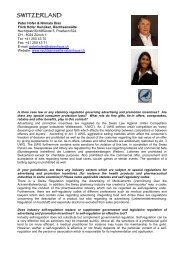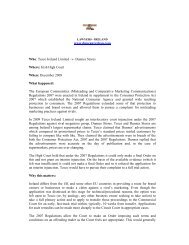list of contributors - GALA
list of contributors - GALA
list of contributors - GALA
Create successful ePaper yourself
Turn your PDF publications into a flip-book with our unique Google optimized e-Paper software.
3. Title Credit Card Companies Prosecuted<br />
Topic: Misleading and deceptive conduct<br />
Where: New Zealand<br />
When: December 2004 onwards<br />
What Happened: The Commerce Commission has filed criminal proceedings against five<br />
banks, two credit card companies and one financial services company<br />
following an industry-wide investigation into the disclosure <strong>of</strong> international<br />
currency conversion fees.<br />
The Commission was concerned after several banks and credit card<br />
companies in New Zealand were charging conversion fees on overseas<br />
currency transactions without disclosing these to cardholders. For overseas<br />
purchases, a credit card statement would typically set out the foreign<br />
purchase price on a transaction alongside the New Zealand dollar amount<br />
for payment.<br />
"The Commission alleges that the fact these statements represent to cardholders that<br />
overseas purchases made on their credit/debit cards are converted into New Zealand<br />
dollars at a prevailing exchange rate is likely to be misleading because the exchange<br />
rate includes embedded and undisclosed conversion fees. In some cases the<br />
conversion fees could add up to 2.5% on the New Zealand dollar cost <strong>of</strong> the overseas<br />
currency transaction for cardholders".<br />
The Commission stated that it is vital that all representations made to<br />
customers are accurate, including telling cardholders whether or not the<br />
exchange rate in their credit card statement included fees.<br />
Comments: Although the individual sums may be small, the overall amount involved<br />
may prove more significant. It will be interesting to see what, if any, refunds<br />
are paid to the individual cardholders concerned.<br />
4. Title Patenting Methods <strong>of</strong> Medical Treatments<br />
Topic: Patents<br />
Where: New Zealand<br />
When: June 2004<br />
What Happened: Pfizer appealed to the Court <strong>of</strong> Appeal when the Assistant Commissioner <strong>of</strong><br />
Patents found that Pfizers two patent applications in 1997 and 1998 relating<br />
to methods <strong>of</strong> treatment <strong>of</strong> psychotic disorders were "not allowable on policy<br />
(moral) grounds (Section 17(1))" under the Patents Act 1953.<br />
It was contended that the Court <strong>of</strong> Appeal should overrule its earlier decision<br />
in Wellcome Foundation Limited vs. Commissioner <strong>of</strong> Patents (1983) NZLR385<br />
that methods <strong>of</strong> treating disease or illness in human beings were not<br />
patentable. Pfizer argued that a series <strong>of</strong> changes to the Patents Act and dicta<br />
in another Court <strong>of</strong> Appeal decision allowing patents for Swiss Forms<br />
removed the reasons for the ban given in the Wellcome case.<br />
The Court <strong>of</strong> Appeal dismissed Pfizer's appeal stating that the decision in the<br />
Wellcome case that a method <strong>of</strong> medical treatment <strong>of</strong> humans is not<br />
patentable continues to remain the law in New Zealand. The scope <strong>of</strong> the<br />
1994 amendments to the Patents Act did not extend to change the position<br />
and any reform <strong>of</strong> this area <strong>of</strong> the law should be undertaken through the<br />
parliamentary process. The complexity <strong>of</strong> the law in this area and the policy<br />
choices required were matters best left to legislative reform.<br />
Comments: A new Patents Bill will be introduced into Parliament in early-mid 2005


